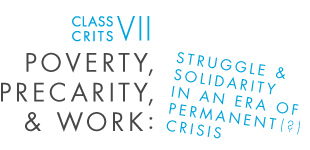The School of Law is pleased to host this year's Class Crits conference on November 14 and 15.

This year marks the 50th anniversary of the enactment of the Civil Rights Act of 1964, President Johnson's declaration of a "War on Poverty," and the establishment of the first Neighborhood Legal Services Program pilot in Washington, D.C. Each of these initiatives attempted to address problems of structural economic inequality-problems that remain with us nationally and internationally. The seventh meeting of ClassCrits will focus on work, poverty, and resistance in an age of increasing economic insecurity.
In law, it is generally easier to discuss "poverty" than to look deeply into its causes and incidents-including income and wealth inequality, the close interaction of class and race in America, and the connections between gender and economic hardship. It is also easier to discuss "poverty" than what some scholars call "precarity"-the increasing vulnerability of workers, even those above the official poverty line, to disaster. Precarity has both economic and political roots. Its economic sources include the casualization of labor, low wages, persistently high unemployment rates, inadequate social safety nets, and constant vulnerability to personal financial catastrophes. Its political sources include the success of neoliberal ideology, upward redistribution of wealth, increasing polarization and dysfunction in Congress, and the dependence of both political parties on a steady stream of big money. Precarity is also not limited to the United States, but is reshaping space around the globe. While the aftermath of the housing bubble and subsequent foreclosures drain home values across America and strip equity disproportionately from minority neighborhoods, in developing-country "megacities," millions of slum-dwellers are displaced to make way for high-end residential and commercial real estate developments.
Finally, this conference focuses on challenging structural forms of inequality from a place of compassion and creating possibilities for resilience. In the words of Martin Luther King, Jr., "True compassion is more than flinging a coin to a beggar. It comes to see that an edifice that produces beggars needs restructuring." In this spirit, ClassCrits VII will explore the risks, uncertainty, and structural challenges of this period and discuss possibilities for shared goals and new forms of resistance.
Speakers from the School of Law include Dean Kevin R. Johnson and Professors Angela Harris, Lisa Ikemoto, Lisa Pruitt, Darien Shanske, Leticia Saucedo, and Brian Soucek.
For more information, visit law.ucdavis.edu/class-crits.